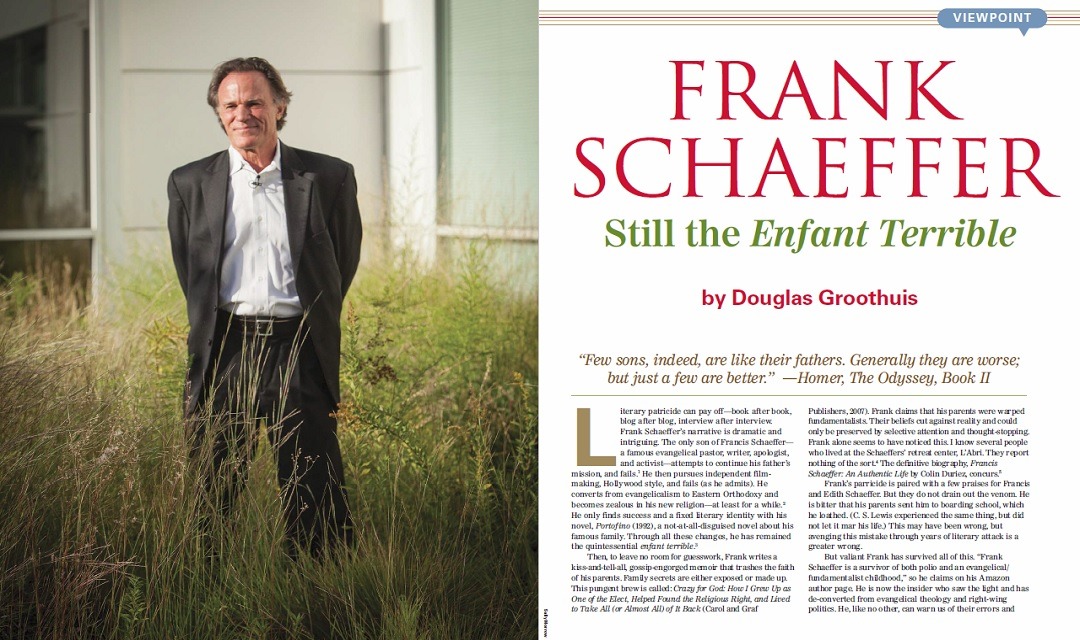This article first appeared in the Christian Research Journal, volume 38, number 03 (2015). The full text of this article in PDF format can be obtained by clicking here. For more information about the Christian Research Journal, click here.
“Few sons, indeed, are like their fathers. Generally they are worse; but just a few are better.” ―Homer, The Odyssey, Book II
Literary patricide can pay off—book after book, blog after blog, interview after interview. Frank Schaeffer’s narrative is dramatic and intriguing. The only son of Francis Schaeffer— a famous evangelical pastor, writer, apologist, and activist—attempts to continue his father’s mission, and fails.1 He then pursues independent filmmaking, Hollywood style, and fails (as he admits). He converts from evangelicalism to Eastern Orthodoxy and becomes zealous in his new religion—at least for a while.2 He only finds success and a fixed literary identity with his novel, Portofino (1992), a not-at-all-disguised novel about his famous family. Through all these changes, he has remained the quintessential enfant terrible.3
Then, to leave no room for guesswork, Frank writes a kiss-and-tell-all, gossip-engorged memoir that trashes the faith of his parents. Family secrets are either exposed or made up. This pungent brew is called: Crazy for God: How I Grew Up as One of the Elect, Helped Found the Religious Right, and Lived to Take All (or Almost All) of It Back (Carol and Graf Publishers, 2007). Frank claims that his parents were warped fundamentalists. Their beliefs cut against reality and could only be preserved by selective attention and thought-stopping. Frank alone seems to have noticed this. I know several people who lived at the Schaeffers’ retreat center, L’Abri. They report nothing of the sort.4 The definitive biography, Francis Schaeffer: An Authentic Life by Colin Duriez, concurs.5
Frank’s parricide is paired with a few praises for Francis and Edith Schaeffer. But they do not drain out the venom. He is bitter that his parents sent him to boarding school, which he loathed. (C. S. Lewis experienced the same thing, but did not let it mar his life.) This may have been wrong, but avenging this mistake through years of literary attack is a greater wrong.
But valiant Frank has survived all of this. “Frank Schaeffer is a survivor of both polio and an evangelical/ fundamentalist childhood,” so he claims on his Amazon author page. He is now the insider who saw the light and has de-converted from evangelical theology and right-wing politics. He, like no other, can warn us of their errors and idiocies. And he never tires of doing so. The Huffington Post, a popular Web site, has been his central platform for his screeds for several years. Defying logic is Frank’s great skill. His latest book is called, Why I Am an Atheist Who Believes in God (CreateSpace, 2014). We will return to this shortly.
Frank’s narrative would be compelling if it were true. But it is not. Frank did perceive the evangelical political movement from the inside and worked with his father in mobilizing evangelicals to become more active, especially concerning abortion, infanticide, and euthanasia. Out of his work came two credible and significant film series, How Should We Then Live? (1976) and Whatever Happened to the Human Race? (1979), both featuring Francis Schaeffer.6 That part of the narrative is true. What is false is Frank’s assessment of his significance in forming the religious right, of evangelicalism, and of politics.
Frank Schaeffer overstates his role as a catalyst for the religious right. The key movers and shakers of the religious right were players such as Pastor Jerry Falwell and televangelist Pat Robertson. It was Francis A. Schaeffer, Frank’s father, who had the greatest influence in getting evangelicals involved in political reform and cultural change. The elder Schaeffer had the knowledge and character that Frank did not. Frank assisted and prodded his father, but he was not a prime mover. He was strident—unlike his father— and lacked the compassion for which Francis Schaeffer was known. Some of us saw this long ago, even before Frank’s defection from evangelicalism. Evangelicalism is a big target for Frank’s fiery darts. He hurls them with vigor, but misses the mark every time. He does not distinguish evangelicalism from fundamentalism, which confuses matters. For Frank, they are the same, since they both affirm the full inspiration and final authority of the Bible as well as Jesus’ claim that “no one can see the kingdom of God unless they are born again” (John 3:3, all Scripture citations NIV). Frank’s conflation of fundamentalism and evangelicalism is odd and inept, since his father broke from a fundamentalist Presbyterian group in the 1950s. He did so because of its lack of love and concern for evangelism.7 Along with Carl Henry, E. J. Carnell, Bernard Ramm, Harold Ockenga, and others, the elder Schaeffer was a leading figure in the development of evangelicalism. That movement shared with fundamentalism the belief in a high view of the Bible and in the historic Protestant doctrines. Evangelical thinkers, unlike fundamentalists, advocated social and political engagement and cultivating the life of the mind.8 Evangelicals did not totally separate from culture and from those who deviated even slightly from their denomination’s doctrine. For these reasons, evangelicals were sometimes accused of being liberal by fundamentalists.9 By failing to make these distinctions, Frank loses credibility.
Betraying his family and trumpeting his dynamism in forming the religious right is not the whole story of Frank Schaeffer. He repudiates conservative politics as much as he repudiates evangelical theology and evangelicals. Conservative Christians are bigots because they oppose gay marriage and homosexual practices. They are dangerous theocrats because they want to impose their Christian values on the entire country. The man who produced Whatever Happened to the Human Race? a film decrying the loss of human dignity through the legalization of abortion, supported pro-abortion Barack Obama for president. Frank backed Obama because he found him thrilling. But goose bumps cannot substitute for reasoning. No performance by Barack Obama or anyone else can change that fact that every abortion ends the life of a living human being who has intrinsic worth conferred by God Himself.
Frank’s attack against politically conservative Christians is reactive, not substantive. He equates disapproval of homosexual practices and opposition to gay marriage with hatred and homophobia. Logic textbooks term this the ad hominem fallacy. Instead of considering the logic of an argument (which is tough work), you tear down the character of the one making the argument. This is a staple of Frank’s rhetorical salvos, along with histrionic overstatements. If one believes that erotic activity outside of heterosexual monogamy is morally wrong, that does not justify hatred toward those who practice it. Those who believe Scripture want to understand and obey what it teaches. The sixty-six books of the Bible nowhere condone sexual intimacy between a man and a man or a woman and a woman. It is condemned. After Paul indicts those who spurn God, he writes:
Therefore God gave them over in the sinful desires of their hearts to sexual impurity for the degrading of their bodies with one another. They exchanged the truth about God for a lie, and worshiped and served created things rather than the Creator—who is forever praised. Amen.
Because of this, God gave them over to shameful lusts. Even their women exchanged natural sexual relations for unnatural ones. In the same way the men also abandoned natural relations with women and were inflamed with lust for one another. Men committed shameful acts with other men, and received in themselves the due penalty for their error. (Rom. 1:24–27)
Paul did not only condemn. He offered pardon through Jesus Christ.
Or do you not know that wrongdoers will not inherit the kingdom of God? Do not be deceived: Neither the sexually immoral nor idolaters nor adulterers nor men who have sex with men nor thieves nor the greedy nor drunkards nor slanderers nor swindlers will inherit the kingdom of God. And that is what some of you were. But you were washed, you were sanctified, you were justified in the name of the Lord Jesus Christ and by the Spirit of our God. (1 Cor. 6:9–11)
Frank makes no argument against the apostle. Instead, he lashes out at those who hold the biblical position and attributes to them the worst possible motives. In his view, they want to undermine democracy itself.
For Frank, conservative Christians want nothing less than a theocracy. If successful, their views will prevail at the expense of the rights of those with whom they disagree. However, the American landscape is so thinly dotted with Christian theocrats that one needs a microscope to find even one. Further, none of them have any power. (Islamic theocrats are another matter.10) Conservative Christians draw on the philosophy of the American founding and the development of its principles over time. This philosophy grounds rights in the character of God, limits the power of the state through the separation of powers, and grants all citizens fair participation in civil life. Christian citizens of the United States have just as much right to bring their moral vision into politics as does any other citizen. A Christian Manifesto, Francis Schaeffer’s best-selling 1981 book, made this case convincingly and urgently, in light of challenges to religious freedom that have increased since its publication.
Francis Schaeffer’s Christian worldview was a coherent combination of reasons to believe and reasons to live out what one believes. Coherence is an intellectual virtue only because it is a philosophical necessity for gaining knowledge. Coherence can be damned, according to Frank Schaeffer. In Why I Am an Atheist Who Believes in God,11 Frank blesses incoherence as a virtue.
This is what Frank Schaeffer has to offer the world. Consider his subtitle: “How to Give Love, Create Beauty and Find Peace.” Advice on the highest order is offered herein. Contradiction is his underpinning. He is an atheist who believes that natural processes explain everything. He is a Christian who thinks there is more to life than matter. Conceptual reconciliation is impossible. Frank claims that this is not a stunt. Rather than making a case for his contradictions (which is impossible), he tells stories about his grandchildren and wife, in whom he delights. They provoke his unsystematic comments on life. Consider his admission: “I can’t objectively describe reality because I’m trapped in the moving target we call time. That’s what the word ‘evolution’ means. The very fabric of the universe is unknowable and stranger than we can imagine and has a message for us: climb down off that high atheist, religious or agnostic pedestal!”12
Frank somehow knows that the universe is unknowable—and that it is strange. He knows that this unknowable universe has a message for us, as well. Can we call nonsense by its name?
The book packs logical, factual, political, and theological errors tighter than sardines in a flattened can. I take up only three more points—his epistemology, his biblical criticism, and his idea of love.
Neither atheists nor Christians can draft Frank for their team. He is of a double mind (see James 1:5–8). Double minds do not deliver knowledge, because they can offer no reasoning to support truth-claims. Frank admits that his beliefs may change completely in the future. If so, there is no reason to believe a word he writes about the most important matters of life: God, humanity, and eternity.
Despite his foundation of fog, Frank offers his higher criticism of the Gospels. He knows what Jesus really said. Hell must go because Frank is repulsed by the idea. But history is not subject to emotional vetoes. In love, Jesus repeatedly warned of an eternal hell (Matt. 25:31–46).13
Lastly, it is ironic that Frank’s most heartfelt advice is that we must love and accept others, unlike those horrible fundamentalists. He does not practice what he preaches. Vitriol and contempt mark every page of this sad and unwise book, just as they stain the rest of his writing and speaking as well.
Douglas Groothuis is professor of philosophy at Denver Seminary, where he heads the apologetics and ethics program.
NOTES
- Frank (then Franky) wrote a few solid (if acerbic) books during this time, such as Addicted to Mediocrity (Wheaton, IL: Cornerstone Books, 1981).
- See Frank Schaeffer, Dancing Alone: The Quest for Orthodox Faith in the Age of False Religion (Brookline, MA: Holy Cross Press, 1994).
- Merriam-Webster has three definitions for enfant terrible, each of which capture something of what Frank Schaeffer is or would like to be: “1 a : a child whose inopportune remarks cause embarrassment b : a person known for shocking remarks or outrageous behavior 2 : a usu. young and successful person who is strikingly unorthodox, innovative, or avant-garde.”
- Theologian William Edgar spent a significant time at L’Abri with the Schaeffers, which he discusses in his book, Schaeffer and the Christian Life: Countercultural Spirituality (Wheaton, IL: Crossway, 2013). See the chapter, “A Personal Introduction to Francis Schaeffer.”
- Colin Dureiz, Francis Schaeffer: An Authentic Life (Wheaton, IL: Crossway Books, 2008).
- These films were both based on books with the same titles: Francis A. Schaeffer, How Should We Then Live? (Old Tappan, NJ: Revel, 1976) and Francis A. Schaeffer and C. Everett Koop, Whatever Happened to the Human Race? (Old Tappan, NJ: Revel, 1979).
- See Edgar, “The Road to L’Abri.”
- For an in-depth treatment of fundamentalism, see George Marsden, Fundamentalism and American Culture, new ed. (New York: Oxford, 2006).
- Ronald Nash defended the evangelical movement in The New Evangelicalism (Grand Rapids: Zondervan, 1963).
- See Robert Spencer, Stealth Jihad: How Radical Islam Is Subverting America without Guns or Bombs (New York: Regnery, 2008).
- Frank Schaeffer, Why I Am an Atheist Who Believes in God (Salisbury, MA: Regina Orthodox Press, 2014), 24.
- Ibid.
- See Douglas Groothuis, “What about Hell?” Christian Apologetics: A Comprehensive Case for Biblical Faith (Downers Grove, IL: InterVarsity Press, 2011).









